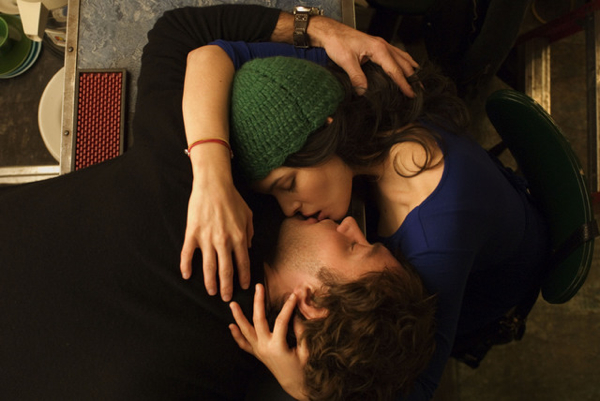Movie review by Greg Carlson
Cult director Wong Kar-wai disappoints his Yankee constituency with “My Blueberry Nights,” his first English language feature. Molded in the same sumptuous, neon-drenched style of Wong’s finest films, “My Blueberry Nights” relies too heavily on greeting card philosophy and a slightly shaky central performance from recording artist Norah Jones, making her big screen debut. Purportedly, Wong designed the role for Jones alone, acting chops be damned. Certainly the singer is a lovely creature, and it is easy to see why Wong wanted to build a movie around her. Regrettably, little of the chanteuse’s seductive and beautiful phrasing comes across on film; one longs for a musical number so that she might be photographed in her element.
The movie’s first section loiters in the NYC café run by the worldly Jeremy (Jude Law). Jones plays Elizabeth, who has recently broken up with her boyfriend. Nursing her wounds with the help of Jeremy’s late night culinary skills, Elizabeth grows fond of, among other things, her new friend’s delectable desserts. Wong often shows the movie’s titular pie in near pornographic close-up, rivulets of melting ice cream cascading through the violet-hued filling. Before she can rush into something with Jeremy, however, Elizabeth hits the road, and “My Blueberry Nights” relocates from the Big Apple to Memphis and then Nevada.
Wong has never hesitated to stitch together storylines that might exist as their own shorter (and possibly better) movies, and “My Blueberry Nights” switches gears rather abruptly once Elizabeth stops in Tennessee. Serving up hash by day and whiskey by night, Elizabeth meets alcoholic cop Arnie (David Strathairn), a broken man at the end of his rope. Arnie has separated from his sultry, unfaithful wife Sue Lynne (Rachel Weisz), though anyone can see that he aches to turn back the hands of time. As one might expect, both Strathairn and Weisz breathe plenty of life into their characters, despite the melodrama with which they are burdened.
Natalie Portman, showing up late as a tough-talking card sharp who can spin lies as effortlessly as the truth, stands in such contrast to Jones that they almost seem to be in different movies. While Portman plows through the emotionally charged territory that has been carved out for her, Jones merely has to watch and listen. Perhaps Wong and co-scripter Lawrence Block were too cautious with the main character. When Chan Marshall shows up as Jeremy’s old flame, her single scene contains more intrigue than the complete running time afforded Jones, whose Elizabeth is given so little to do.
Thematically, “My Blueberry Nights” revisits some of the director’s familiar lovelorn turf, and Jeremy’s Klyuch eatery will remind Wong admirers of the Midnight Express lunch counter that figured so prominently in the masterful “Chungking Express.” Both restaurants attract broken-hearted souls who turn over keys to the proprietors for safekeeping and/or delivery to ex-lovers. Always a sucker for a clever or cute conceit, Wong trades in a pushpin-pierced envelope for a fishbowl, but the core idea remains the same. Needless to say, Wong’s earlier movies were more exciting, more romantic, and more urgent than “My Blueberry Nights.” If America was a nice place for a visit, here’s hoping that Hong Kong will always be home.
